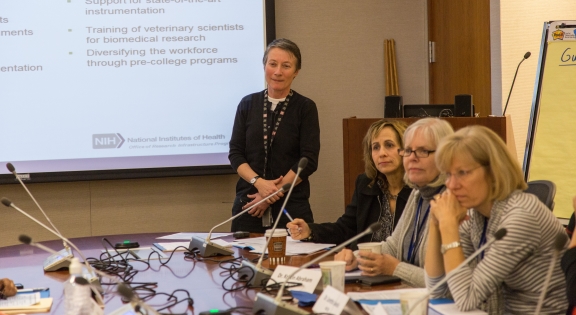Workshop Reports

ORIP plans, organizes, and conducts workshops both independently and in collaboration with NIH Institutes, Centers, and Offices. Review the reports, summaries, and other materials below to find out what happened at events related to ORIP’s mission and programs. These include comparative medicine and resource-related reports that showcase how animal models are furthering clinical and translational research and how resources are managed to maximize efficiency. To view reports from before the last 5 years, visit Archived Workshop Reports.
Cryopreservation and Other Preservation Approaches for Animal Models Workshop
September 2024 to February 2025
The Cryopreservation and Other Preservation Approaches for Animal Models Workshop provided a forum for experts to discuss the needs of cryopreservation and other preservation approaches for animal models that are widely used in biomedical research. The discussions focused on the current emerging technologies. The goal of the workshop was to enhance the maintenance and sharing of animal models.
The workshop was organized in six sessions focused on (1) invertebrate models, (2) aquatic models, (3) technologies and training, (4) rodent models, (5) nonhuman primate models, and (6) swine models. The workshop gathered insights and conclusions from experts in the field and led to the release of a workshop report and, potentially, journal article(s). The workshop also allowed refinement of NIH programs on preservation of genetic stocks of animal resources for biomedical research.
- Session I. Cryopreservation and Other Preservation of Invertebrate Models in Biomedical Research, September 6, 2024
- Session II. Development of Sustainable Germplasm Repositories for Aquatic Biomedical Models, September 9–10, 2024
- Session III. Cryoresearch: Supporting Technology and Resources, September 30, 2024
- Session IV. Cryopreservation and Other Preservation Methods for Rodent Models in Biomedical Research, October 16, 2024
Fourteenth Comparative Medicine Resource Directors Meeting: Advancing Biomedical Research—Integrative Approaches and Innovations
August 6–7, 2024
The biennial Comparative Medicine Resource Directors (CMRD) Meeting is intended to provide a forum for exchange of new information, advances, and ideas; facilitate the development of synergistic working groups, interactions, and collaborations among resources, as well as with National Institutes of Health (NIH) institutes, centers, and offices; and offer opportunities for sharing experiences, strategies, and best practices to optimize access, use, and administration of resources. The fourteenth CMRD Meeting was held August 6 and 7, 2024. The purpose of the 2024 meeting was to form and strengthen new and existing connections, disseminate information about new resources and opportunities to collaborate, expand networks, learn about new NIH strategic plans and policies, and reinforce the important roles the CMRD community plays in driving biomedical research.
Videos Highlighting ORIP Research Resources
- Center for Precision Animal Modeling (C-PAM)
- Aquatic Germplasm and Genetic Resources Center (AGGRC)
- Ambystoma Genetic Stock Center (AGSC)
- An Integrated Platform for Diploid Germplasm Conservation in Zebrafish
- Drosophila RNAi Screening Center (DRSC) and Transgenic RNAi Project (TRiP)
- Drosophila Cryopreservation at the University of Minnesota
- Neotropical Primate Reagent Resource
- Human Tissues and Organs for Research Resource (HTORR)
- Building a Wide-Field, High-Resolution Histotomography Resource for Biology
- Mouse Peroxisome Research Resource (MPRR)
- Community Resource for Germline and Somatic Genetic Disease Modeling in Zebrafish
- Precision Medicine Nonhuman Primate (NHP) Resource
- JAX Center for Precision Genetics
- Comprehensive Resource for the Drosophila 4th Chromosome
- New World Monkey Immunoreagent Resource
- Xenopus Cell Atlas
- Xiphophorus Genetic Stock Center (XGSC)
- National Xenopus Resource (NXR)
Enhance Rigor and Reproducibility in Animal Research by Managing Extrinsic Factors
September 23, 2022, to September 30, 2022
The Office of Research Infrastructure Programs (ORIP) organized this workshop with the support of the following seven NIH Institutes:
- National Cancer Institute (NCI)
- National Heart, Lung, and Blood Institute (NHLBI)
- National Institute on Aging (NIA)
- National Institute of Allergy and Infectious Diseases (NIAID)
- Eunice Kennedy Shriver National Institute of Child Health and Human Development (NICHD)
- National Institute of Diabetes and Digestive and Kidney Diseases (NIDDK)
- National Institute of General Medical Sciences (NIGMS)
The workshop served as a forum to discuss the current status of and needs for understanding extrinsic environmental factors, their potential impact on animal research outcomes, as well as how facilities may optimally manage, monitor, and report these extrinsic factors to enhance rigor and reproducibility in animal research. The focus of this workshop was on identifying gaps, opportunities, and new approaches in husbandry of commonly and widely used animal models; measuring and monitoring relevant environmental factors and conditions; and exploring the need for novel instruments, equipment, and infrastructure for animal research core facilities.
- Session 1. Aquatic Animals, September 23, 2022
- Session 2. Rodents, September 28, 2022
- Session 3. Large Animals (Nonhuman Primates/Swine), September 30, 2022
- All Sessions



